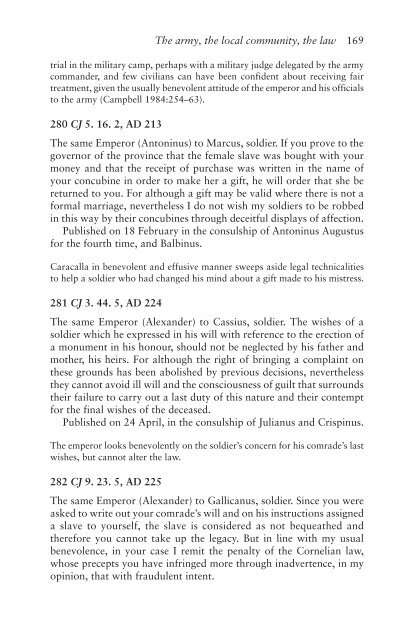The Roman Army, 31 BC–AD 337: A Sourcebook
The Roman Army, 31 BC–AD 337: A Sourcebook
The Roman Army, 31 BC–AD 337: A Sourcebook
Create successful ePaper yourself
Turn your PDF publications into a flip-book with our unique Google optimized e-Paper software.
<strong>The</strong> army, the local community, the law 169<br />
trial in the military camp, perhaps with a military judge delegated by the army<br />
commander, and few civilians can have been confident about receiving fair<br />
treatment, given the usually benevolent attitude of the emperor and his officials<br />
to the army (Campbell 1984:254–63).<br />
280 CJ 5. 16. 2, AD 213<br />
<strong>The</strong> same Emperor (Antoninus) to Marcus, soldier. If you prove to the<br />
governor of the province that the female slave was bought with your<br />
money and that the receipt of purchase was written in the name of<br />
your concubine in order to make her a gift, he will order that she be<br />
returned to you. For although a gift may be valid where there is not a<br />
formal marriage, nevertheless I do not wish my soldiers to be robbed<br />
in this way by their concubines through deceitful displays of affection.<br />
Published on 18 February in the consulship of Antoninus Augustus<br />
for the fourth time, and Balbinus.<br />
Caracalla in benevolent and effusive manner sweeps aside legal technicalities<br />
to help a soldier who had changed his mind about a gift made to his mistress.<br />
281 CJ 3. 44. 5, AD 224<br />
<strong>The</strong> same Emperor (Alexander) to Cassius, soldier. <strong>The</strong> wishes of a<br />
soldier which he expressed in his will with reference to the erection of<br />
a monument in his honour, should not be neglected by his father and<br />
mother, his heirs. For although the right of bringing a complaint on<br />
these grounds has been abolished by previous decisions, nevertheless<br />
they cannot avoid ill will and the consciousness of guilt that surrounds<br />
their failure to carry out a last duty of this nature and their contempt<br />
for the final wishes of the deceased.<br />
Published on 24 April, in the consulship of Julianus and Crispinus.<br />
<strong>The</strong> emperor looks benevolently on the soldier’s concern for his comrade’s last<br />
wishes, but cannot alter the law.<br />
282 CJ 9. 23. 5, AD 225<br />
<strong>The</strong> same Emperor (Alexander) to Gallicanus, soldier. Since you were<br />
asked to write out your comrade’s will and on his instructions assigned<br />
a slave to yourself, the slave is considered as not bequeathed and<br />
therefore you cannot take up the legacy. But in line with my usual<br />
benevolence, in your case I remit the penalty of the Cornelian law,<br />
whose precepts you have infringed more through inadvertence, in my<br />
opinion, that with fraudulent intent.



